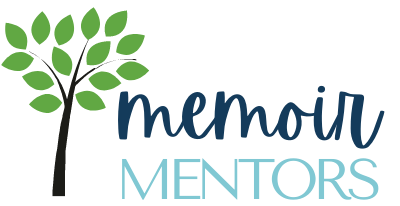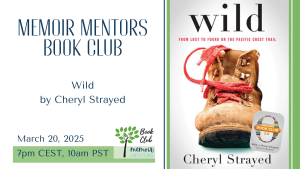Hey everyone,
Winter may still have its grip on us, but the longer days and occasional bursts of sunshine make it a great time to cozy up with a good book. If you didn’t get around to reading Paula Balzer’s Writing and Selling Your Memoir, this is the perfect chance to dive in—or, if you’re ready for something new, we’ll be discussing Wild by Cheryl Strayed for our next book club on March 20. I’m definitely looking forward to reading it again!
In this newsletter, you’ll find:
📖 A new way to support our the community
✍️ A reminder to submit your story for the Memoir Mentors Anthology
🚀 An update on the Pen Your Masterpiece Accountability Hub—the momentum is already building
📚 A recap of our discussion on Writing and Selling Your Memoir and what we took away from it
🥾 Announcing our next book club read: Wild by Cheryl Strayed! (Discussion on March 20)
Community Support & Valuing the Craft
One of the challenges of running a writing community is covering the costs that keep us connected—Meetup and Zoom fees have increased this year, and I rely on contributions to keep things running. But beyond that, I’ve been thinking a lot about how we, as writers, can support each other in ways that recognize the time, energy, and effort we put into our craft.
Recently, I shared the Reading Like a Writer journal guide with a few regulars, and they found it so useful that I decided to offer it as my first paid post on Substack. If you’d like to support my work—and get a practical resource in return—you can check it out here:
👉 Reading Like a Writer: A Guide to Deepening Your Memoir Craft
I know I’m not the only one exploring ways to make creative work more sustainable. Have any of you tried running a paid Substack or something similar? I’d love to hear your thoughts—whether you’ve experimented with it yourself or supported other writers this way. Please reply to this email with your comments.
I’m still figuring out what else I’ll post there in the future, but for now, I’m enjoying the process and have already connected with some new members there. If you’re on Substack too, let me know—I’d love to follow you back!
If you prefer to support the community through other means, donations are always welcome here:
💙 Donate via Stripe → Click here
💙 Donate via PayPal → Click here
Call for Anthology Submissions
I’m really enjoying the submissions for the Memoir Mentors Anthology: The Day That Changed Everything that our early birds have submitted! The deadline for entries is March 31. If you have a story that fits, I’d love to see it. This is a great opportunity to share your work and be part of a meaningful collection. Find all the details here:
🔗 Submit Your Story
Accountability Hub Pilot Program Update: The Energy is Already Building!
The Pen Your Masterpiece Accountability Hub pilot hasn’t officially started yet, but the momentum is already growing. Our WhatsApp group is buzzing with encouragement, and people (myself included!) who have been struggling to make time for writing are feeling a renewed enthusiasm. I’m excited to see what unfolds!
Hugs!
~Christina

Book Club Discussion – Writing and Selling Your Memoir by Paula Balzer

![]() Reader rating of 4.2 stars for:
Reader rating of 4.2 stars for:
Writing and Selling Your Memoir, by Paula Balzer
I really enjoyed our discussion on Paula Balzer’s Writing and Selling Your Memoir. It spurred some valuable insights and reflections on the memoir-writing process. Overall, the book was well-received, with an average rating of 4.2 stars. Readers found it extremely helpful, appreciating its practical guidance. One reader described it as a perfect “nuts and bolts” book—one to revisit as they refine their work.
Our conversation also inspired me to write this Substack post on why we write memoir: https://memoirmentors.substack.com/p/memoir-as-meaning-making
Who Are We Writing For?
One of the biggest discussion points was the tension between writing for yourself and writing for an audience. The first draft is often a space for discovery, but if the goal is traditional publication, Paula Balzer writes that the memoir needs to be a totally unique story crafted with a clear hook and a marketable angle—sometimes at the expense of what the writer originally wanted to say.
There was also frustration with the publishing industry, where memoirs are often rejected for being either “too niche” or “not unique enough.” Even powerful, well-written stories may need reshaping to fit industry expectations.
What to Include & What to Leave Out
There was also discussion about the misconception that memoir is a life story. In reality, it’s a curated narrative, not an autobiography. The challenge lies in choosing what serves the story best. A common pitfall is including too much—whether excessive backstory, multiple themes, or overwhelming trauma. Some readers admitted they would stop reading a memoir if it became too emotionally relentless. Less is more—if a reader disengages, the message gets lost.
The Role of a Hook in Memoir
We explored the idea of a “hook” and whether it’s the same as an elevator pitch. To be honest, we’re not sure! Whatever the case, having a hook helps focus the story and make it more marketable. A strong hook can draw readers in, but great writing is what keeps them engaged.
Struggles with Memoir Marketing
Another area that Balzer covered in her book was marketing. Most of us writers feel that marketing and platform-building can feel like a distraction from writing. Some of our members have taken social media breaks and have found they were more focused and happier without it. Substack was mentioned as a promising alternative—a space to connect with readers without the burnout of traditional social media. Regardless of platform, consistency is key. Ironically, the posts that require the least effort sometimes get the most engagement.
I have shared this before, but it’s worth resharing. This post has some of the best ideas I’ve found to promote your writing in a way that feels authentic and not too “salesy.”
Key Takeaways from the Book
Something our readers appreciated was that the book asked the right questions to help shape their memoirs. The section on structuring a memoir—timing, framework, and how to piece everything together—stood out as particularly useful. The book reinforced the idea that writing a memoir takes time and that uncovering the real story beneath lived experience is just as important as the writing itself.
Books to Revisit and Analyze for Craft
Another point that Balzer made was how important it is for us to read the genre and not only that, but she suggested taking notes on what we read.
For future meetings, the group expressed interest in rereading and analyzing what made certain memoirs successful. Some titles suggested included:
- Wild by Cheryl Strayed — we’ll be discussing this one on March 20
- Tender at the Bone by Ruth Reichl
- The Color of Water by James McBride
- Running with Scissors by Augusten Burroughs
Next Book Club Choice: Wild – by Cheryl Strayed
This time, we’ll be discussing:
Wild by Cheryl Strayed – This book is often used as an example of a well-crafted memoir, particularly in discussions of structure, voice, and emotional depth. As we read, let’s consider how we can apply Strayed’s techniques to our own writing.
What it’s about:
At twenty-two, Cheryl Strayed thought she had lost everything. In the wake of her mother’s death, her family scattered and her own marriage was soon destroyed. Four years later, with nothing more to lose, she made the most impulsive decision of her life. With no experience or training, driven only by blind will, she would hike more than a thousand miles of the Pacific Crest Trail from the Mojave Desert through California and Oregon to Washington State — and she would do it alone.
Told with suspense and style, sparkling with warmth and humor, Wild powerfully captures the terrors and pleasures of one young woman forging ahead against all odds on a journey that maddened, strengthened, and ultimately healed her.
Find our Book Club Questions here: https://memoirmentors.com/book-club-questions/
Upcoming events
February 2025:
-
February 13: Write then Read
-
February 20: Write then Read
-
February 27: Speaking Your Story
March 2025:
-
March 6: Write then Read
-
March 13: Write then Read
-
March 20: Book Club: Wild by Cheryl Strayed
-
March 27: Speaking Your Story
Ideas? Questions? Suggestions?
 Reply to this email and let me know or reach out directly at: xtina.howell@memoirmentors.com
Reply to this email and let me know or reach out directly at: xtina.howell@memoirmentors.com

